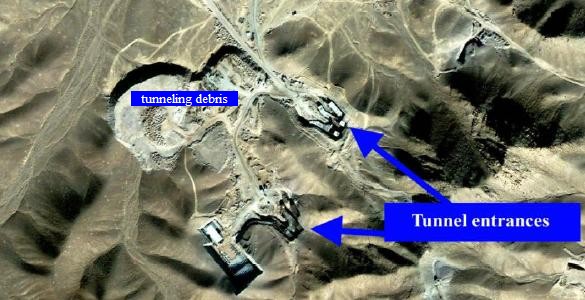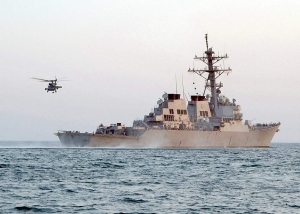How to press the advantage with Iran
Absent some agreement with Washington on its long-term goals, Iran’s national security strategy will continue emphasizing “asymmetric” defense against perceived American encirclement. Over several years, officials in both the reformist government of Mohammad Khatami and the conservative Ahmadinejad administration have told us that this defensive strategy includes cultivating ties to political forces and militias in other states in the region, developing Iran’s missile capacity (as underscored by this weekend’s tests of medium-range missiles), and pushing the limits of Tehran’s nonproliferation obligations to the point where it would be seen as having the ability and ingredients to make fission weapons. It seems hardly a coincidence that Iran is accused of having started the Qum lab in 2005 — precisely when Tehran had concluded that suspending enrichment had failed to diminish American hostility.
American officials tend to play down Iranian concerns about American intentions, citing public messages from President Obama to Ayatollah Ali Khamenei, Iran’s supreme leader, as proof of the administration’s diplomatic seriousness. But Tehran saw these messages as attempts to circumvent Iran’s president — another iteration, in a pattern dating from Ronald Reagan’s Iran-Contra scandal, of American administrations trying to create channels to Iranian “moderates” rather than dealing with the Islamic Republic as a system. President Ahmadinejad underscored this point to us by noting that Mr. Obama never responded to his congratulatory letter after the 2008 United States election — which, he emphasized, was “unprecedented” and “not easy to get done” in Iran.
The Obama administration’s lack of diplomatic seriousness goes beyond clumsy tactics; it reflects an inadequate understanding of the strategic necessity of constructive American-Iranian relations. If an American president believed that such a relationship was profoundly in our national interests — as President Richard Nixon judged a diplomatic opening to China — he would demonstrate acceptance of the Islamic Republic, even as problematic Iranian behavior continued in the near term. [continued…]
IRGC air force commander: missile tests defensive;
pledges Iran to ‘no first strike’
he USG Open Source Center translated remarks to Iranian television of General Hoseyn Salami, commander of the Iranian Revolutionary Guards Air Force concerning Iran’s Monday missile tests (Islamic Republic of Iran News Network Television (IRINN), Monday, September 28, 2009):
Gen. Salami said, “as long as our enemies act within a political domain, our behavior will be completely political. However, if they want to leave the domain of political action and enter the domain of military threat, then our action will be exactly and completely military.” . . .
Many Western media reports implied that the missile tests were launched along with threats to wipe out Israel. But note that the commanding officer overseeing them explicitly restated Iran’s “no first strike” pledge. To my knowledge, no current high official in the Iranian executive has threatened war against Israel, which in any case would be foolhardy given Israel’s nuclear arsenal (see below). Iranian officials do say they hope the “Zionist regime” will collapse as the Soviet Union did. [continued…]
Iran’s core obligation to the Nuclear Non-Proliferation Treaty, which it says it fully upholds, is to ensure that all its nuclear activities are exclusively for peaceful purposes — building an underground nuclear facility on a military base certainly raises questions about Iranian intentions. Finally, because it was a clandestine plant, the Qom facility was clearly much more suited to military ends than the facility at Natanz, which is subject to IAEA monitoring.
Although the military purpose of the Qom facility is compelling, Ahmadinejad’s legal arguments are not. “According to the IAEA rules, countries must inform the agency six months ahead of the gas injection in their uranium enrichment plants,” he said last week. “We have done it 18 months ahead and this should be appreciated, not condemned.”
But Ahmadinejad got the IAEA rules wrong. At issue is a seemingly obscure but crucially important provision known as “Code 3.1”. This is contained within Iran’s “subsidiary arrangements,” the detailed legal agreement with the IAEA specifying the nuts and bolts of safeguards. [continued…]
U.S. aims to isolate Iran if talks fail
The Obama administration is laying plans to cut Iran’s economic links to the rest of the world if talks this week over the country’s nuclear ambitions founder, according to officials and outside experts familiar with the plans.
While officials stress that they hope Iran will agree to open its nuclear program to inspection, they are prepared by year’s end to make it increasingly difficult for Iranian companies to ship goods around the world. The administration is targeting, in particular, the insurance and reinsurance companies that underwrite the risk of such transactions.
Officials are also looking at ways to keep goods from reaching Iran by targeting companies that get around trading restrictions by sending shipments there through third parties in Dubai, United Arab Emirates; Hong Kong; and other trading hubs. [continued…]


 — If the Iranian revolutionary court recently trying protesters in Tehran had been able to subpoena Hillary Clinton to testify on behalf of the prosecution, this is what they would have wanted her to say: “behind the scenes, we were doing a lot.”
— If the Iranian revolutionary court recently trying protesters in Tehran had been able to subpoena Hillary Clinton to testify on behalf of the prosecution, this is what they would have wanted her to say: “behind the scenes, we were doing a lot.” One Defense Department official, who spoke on the condition of anonymity to describe early reports from the Navy’s regional headquarters in Bahrain, said that the Iranian boats made a radio threat that the American ships would explode.
One Defense Department official, who spoke on the condition of anonymity to describe early reports from the Navy’s regional headquarters in Bahrain, said that the Iranian boats made a radio threat that the American ships would explode.